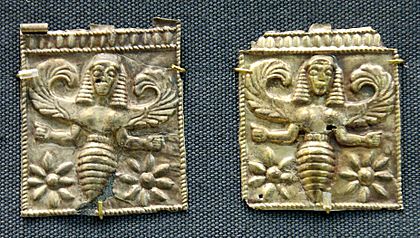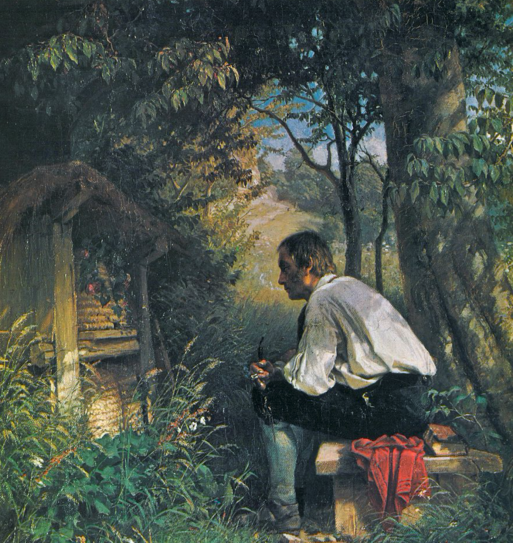What would we do without bees? Their one of Gaia’s major pollinators. Researchers today claim without bees humanity will cease to exist. Bees and bee keeping have been around since antiquity. Bees were known to help newly departed souls bridge from our world to the underworld by the Aegean/Greek civilization.
Bees were sought out by folks to provide honey with it’s health properties to make cough syrup or sweeten tea and breads. Honey was used in mead and the wax of the honey comb used to make candles. Royal jelly has been touted for its’ nutritional benefits.
Below: Gold plaques engraved with winged bee goddesses from the Thriae, 3 virginal nymph sisters, Naiads in Greek mythology who were known as protectors of bees. These gold plaques were discovered in Camiros, Rhodes, 7th century BCE now displayed at the British Museum in London UK

In the UK, Germany, parts of Europe and North America the tradition of Telling the Bees was very important to the bee keepers. A bee keeper was to tell the bees when a family member died in order for the bees to continue working in the hive. If a bee keeper neglected his/her’s responsibility of communicating with the bees, the bumblebees would become dormant and stop producing honey comb or they would literally buzz off and make a nest elsewhere. Bees were told of every major family event not just deaths such as weddings and births. If the beekeeper passed on the funeral food and wine would be left near the hive in honor of the beekeeper and to signal to the bees their dear keeper departed. Some folks would have the hive face the funeral procession and drape the hive with a black cloth representing mourning of their dead beekeeper. “The good wife of the house,” had to knock quietly on the hives and would address the bees about her husband’s death usually with a rhyme or diddy. A tune from Nottinghamshire had the wife or beekeeper sing, “The master’s dead, but don’t you go; Your mistress will be a good mistress to you.” A German oration noted “Little bee, our lord is dead; Leave me not in my distress.”
Below: painting by Charles Napier Hemy The Widow (1895.)

More Bee lore:
If bumblebees fly into your house a stranger will soon come a knocking.
When bees land upon your roof good luck will follow.
It is bad fortune to sell a bee hive, if you do there goes your luck with it.
Telling the Bees
by John Greenleaf Whittier 1807-1892
Here is the place; right over the hill
Runs the path I took;
You can see the gap in the old wall still,
And the stepping-stones in the shallow brook.
There is the house, with the gate red-barred,
And the poplars tall;
And the barn’s brown length, and the cattle-yard,
And the white horns tossing above the wall.
There are the beehives ranged in the sun;
And down by the brink
Of the brook are her poor flowers, weed-o’errun,
Pansy and daffodil, rose and pink.
A year has gone, as the tortoise goes,
Heavy and slow;
And the same rose blows, and the same sun glows,
And the same brook sings of a year ago.
There ’s the same sweet clover-smell in the breeze;
And the June sun warm
Tangles his wings of fire in the trees,
Setting, as then, over Fernside farm.
I mind me how with a lover’s care
From my Sunday coat
I brushed off the burrs, and smoothed my hair,
And cooled at the brookside my brow and throat.
Since we parted, a month had passed,—
To love, a year;
Down through the beeches I looked at last
On the little red gate and the well-sweep near.
I can see it all now,—the slantwise rain
Of light through the leaves,
The sundown’s blaze on her window-pane,
The bloom of her roses under the eaves.
Just the same as a month before,—
The house and the trees,
The barn’s brown gable, the vine by the door,—
Nothing changed but the hives of bees.
Before them, under the garden wall,
Forward and back,
Went drearily singing the chore-girl small,
Draping each hive with a shred of black.
Trembling, I listened: the summer sun
Had the chill of snow;
For I knew she was telling the bees of one
Gone on the journey we all must go!
Then I said to myself, “My Mary weeps
For the dead to-day:
Haply her blind old grandsire sleeps
The fret and the pain of his age away.”
But her dog whined low; on the doorway sill,
With his cane to his chin,
The old man sat; and the chore-girl still
Sung to the bees stealing out and in.
And the song she was singing ever since
In my ear sounds on:—
“Stay at home, pretty bees, fly not hence!
Mistress Mary is dead and gone!”
Source & Reference:
Featured image: The Bee friend by Hans Thoma 1839-1924.
Hamilton Edith, Mythology ©1942 Edith Hamilton ISBN 978-0-316-22333-1
Kite W, “Telling the Bees,” The Magazine of American History with Notes and Queries 21 (A. S. Barnes & Company, 1889), 523.




You must be logged in to post a comment.